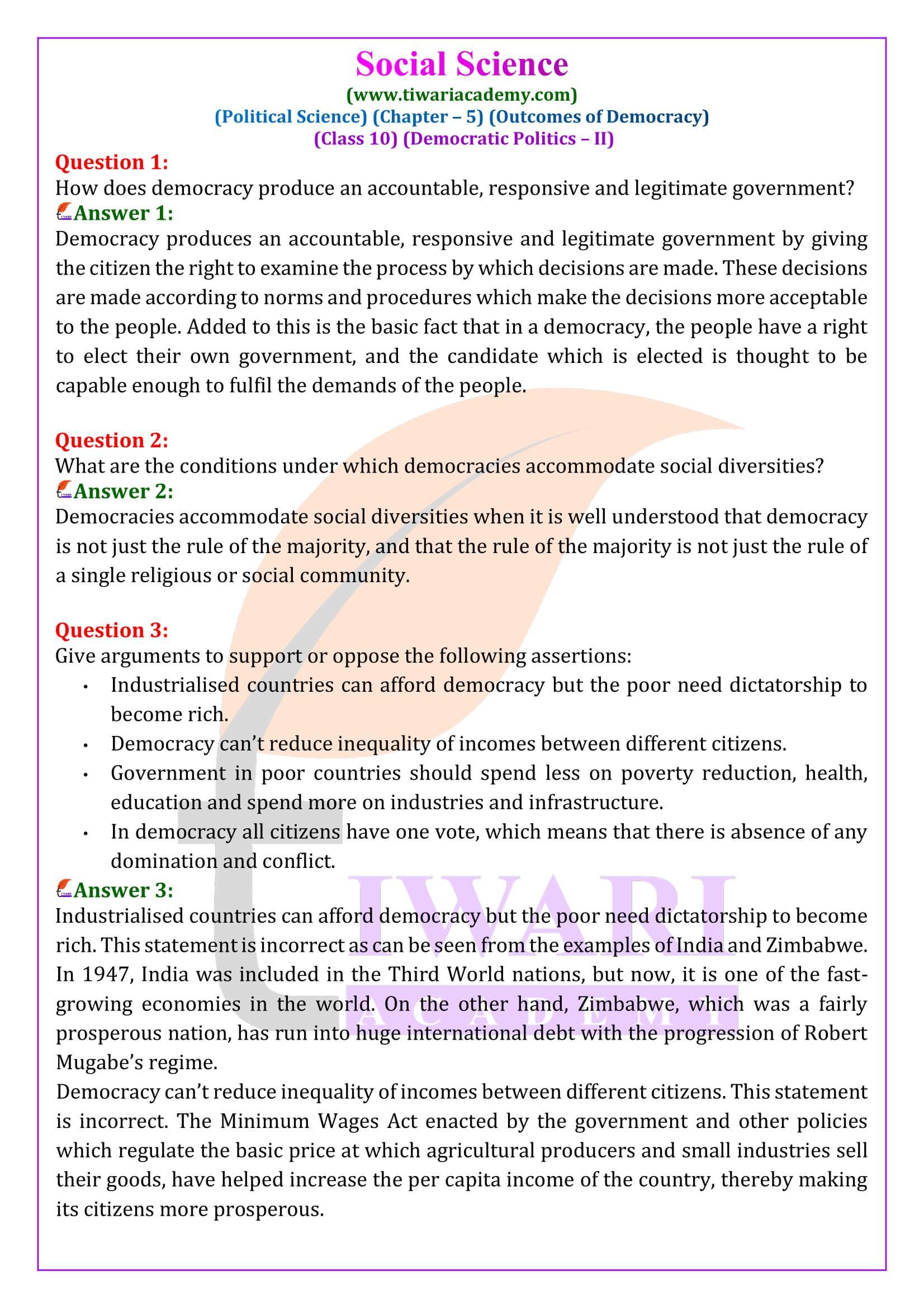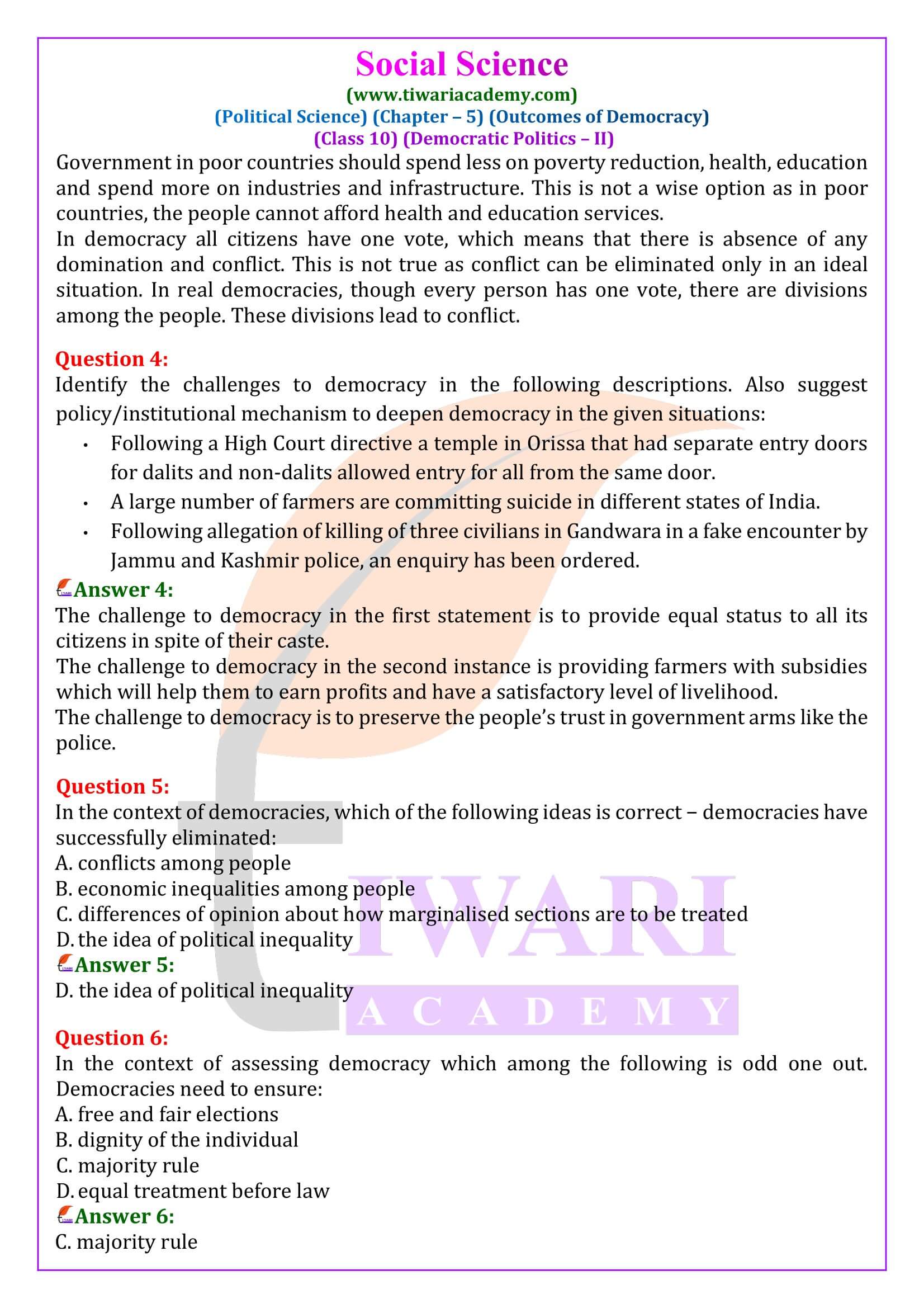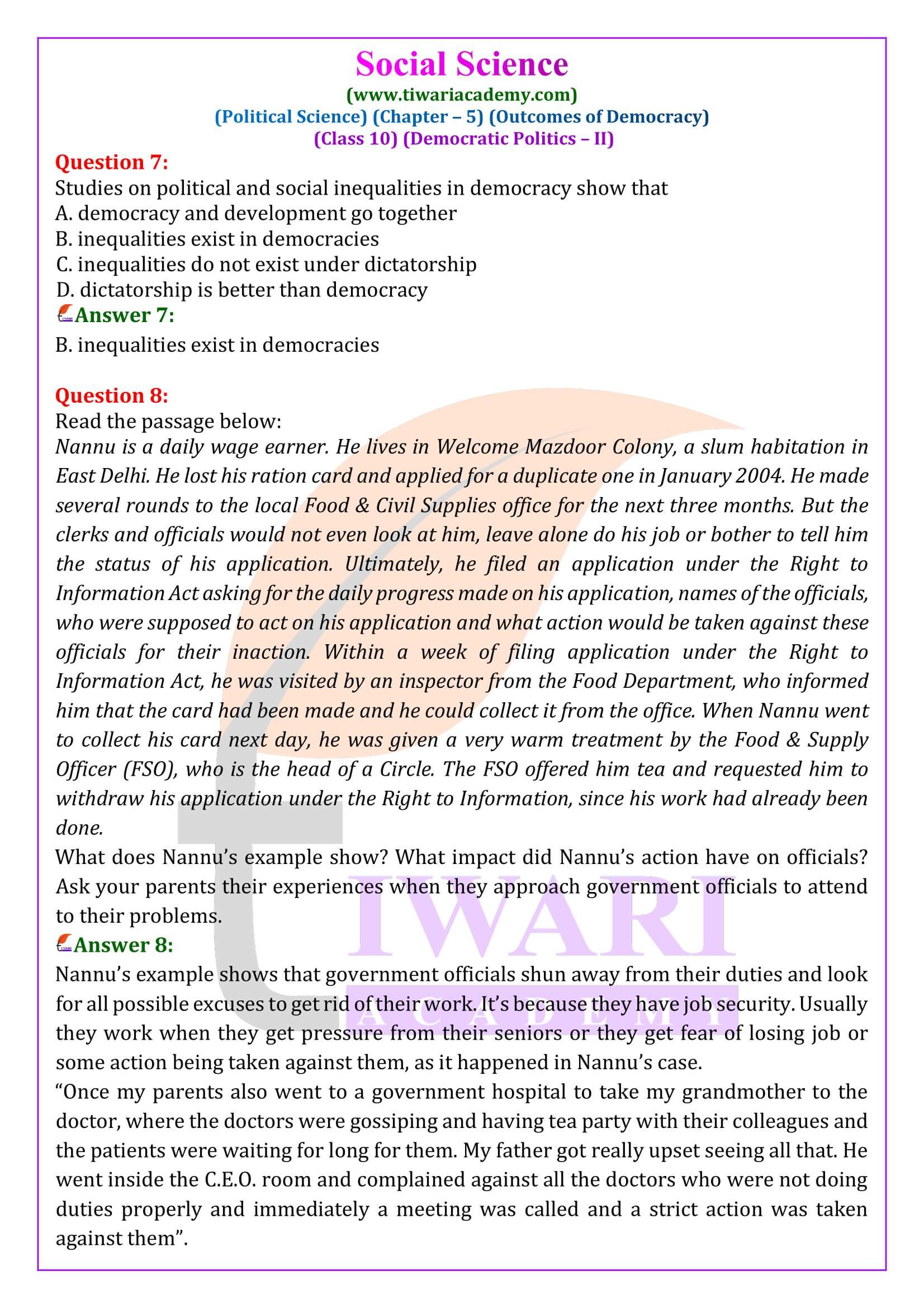NCERT Solutions for Class 10 Political Science Chapter 5 Outcomes of Democracy in English and Hindi medium updated for new academic session 2025-26 based on revised CBSE Syllabus and updated NCERT Books. In this chapter we will learn how do we assess democracy’s outcomes. Accountable, responsive and legitimate government with Economic growth and development, Reduction of inequality and poverty, Accommodation of social diversity and Dignity and freedom of the citizens.
NCERT Solutions for Class 10 Civics Chapter 5
NCERT Solutions for Class 10 Civics Chapter 5
NCERT Solutions for Class 10 Civics Chapter 5
NCERT Solutions for Class 10 Civics Chapter 5 to download updated for new academic session 2025-26. Download Study Material, NCERT Books, Offline Apps and other supportive material based on latest CBSE Syllabus.
| Class: 10 | Political Science |
| Subject: | Social Science – Civics |
| Chapter 5: | Outcomes of Democracy |
| Academic Session: | 2025-26 |
Class 10 Civics Chapter 5 Extra Questions
How are democratic governments better than other forms of governments?
Democracy is always preferable and superior to any other form of government because of the following reasons:
(i) Democracy promotes equality among citizens.
(ii) Democracy enhances dignity of individuals.
(iii) Democracy improves the quality of decision making.
(iv) Democracy develops competitive attitude
(v) Democracy evolves mechanism to negotiate
(vi) Democracy represents the general view
(vii) Democracy provides and accountable, responsive and legitimate government.
What are the main features that are common in all democratic set-ups of the governments?
Common features in all the democratic set-ups are:
(i) Elections are held at regular intervals and are free and fair.
(ii) A democracy has a multi-party system and elections are held on the basis of universal adult franchise.
(iii) Freedom of speech, expression and thought is another feature of democracy.
(iv) The media is free and helps in building a sound public opinion.
(v) Democracy gives its citizens a sound political system bases on equality.
(vi) Another feature of a democracy is a strong opposition which keeps in check the ruling party or the government.
(vii) One can correct one’s mistakes in a democracy and avoid conflicts.
What is the main outcome of democracy with reference to reduction of inequality and poverty?
Democracy is based on political equality. All individuals have equal right in electing representatives. Parallel to the process of bringing individuals into the political arena on an equal footing, find growing economic inequalities. A few number of rich enjoy a highly disproportionate share of wealth and incomes. Not only that their share in the total income of the country has been increasing. Those at the bottom of the society have very little to depend upon. Their incomes have been declining and sometimes they find it difficult to meet their basic needs of life such as food, clothing, house, education and health.
What are the merits and demerits each of dictatorship?
Merits:
(i) There are no competing political parties. Which ensures stability in the government.
(ii) The orders are carried out as soon as they are passed in dictatorship. This brings speed and efficiency in the system.
(iii) The dictators take all the decisions themselves. This enables them to take quick and decisive decisions.
Demerits:
(i) Suppression of civil Liberties. The people are not allowed to disagree with the policies and programs of the government.
(ii) As all the decisions are taken by the dictators themselves, therefore, they do not consult anybody before taking decisions.
(iii) Violence: Violence is very common in dictatorship. The dictators can go to any extent to remain in the power.
Important Terms related to 10 Civics Chapter 5
Sovereignty: Supreme power of the state to take decisions in the internal as well as external matters.
Democracy: Democracy is a government in which everyone has a share.
Accountability: The responsibility or obligation of government officials to act in the best interests of people or society.
Dictatorship: An autocratic form of absolute rule by leadership unrestricted by law, constitution or other social and political factors.
By-elections: Special elections to few seats rendered vacant during the running term (by death, resignation or disqualification).
Legitimate Government: A government under which law and action of the government are revealed to the people and government function in transparent manner.
One Mark Questions with Answers
1. What is meant by Ballot?
2. In Which South Asian country is dictatorship preferred over democracy?
3. What does mean transparency?
4. Which South Asian country has always had a democratic government since independence?
5. Why is there a delay in decision-making and implementation in a democracy?
6. Which aspect of democracy describes that it is a government run by the consent of the people?
7. Which form of government stands much superior in promoting dignity and freedom of the individual?
8. Decisions taken by which type of government are likely to be more acceptable to the people and more effective?
9. Which South Asian country remains least doubtful about the suitability of democracy for its country?
10. Who has said ” Democracy is a government of the people, by the people and for the people.”
Answers of 1 Mark Questions
1. The paper on which the names of the candidates who are contesting elections for a particular office are printed and the voters indicate their choice for a particular candidate.
2. Pakistan
3. Right to examine decision making process.
4. India
5. Democracy is based on the idea of deliberation and negotiation.
6. Political Aspect
7. Democratic form of government.
8. Democratic government.
9. India
10. Abraham Lincoln.
Important Questions on Class 10 Civics Chapter 5
How does democracy produce an accountable, responsive and legitimate government?
Democracy produces an accountable, responsive and legitimate government by giving the citizen the right to examine the process by which decisions are made. These decisions are made according to norms and procedures which make the decisions more acceptable to the people. Added to this is the basic fact that in a democracy, the people have a right to elect their own government, and the candidate which is elected is thought to be capable enough to fulfil the demands of the people.
Democracies accommodate social diversities when it is well understood that democracy is not just the rule of the majority, and that the rule of the majority is not just the rule of a single religious or social community.
Why can Industrialised countries afford democracy but the poor need dictatorship to become rich?
Industrialised countries can afford democracy but the poor need dictatorship to become rich. This statement is incorrect as can be seen from the examples of India and Zimbabwe. In 1947, India was included in the Third World nations, but now, it is one of the fast-growing economies in the world. On the other hand, Zimbabwe, which was a fairly prosperous nation, has run into huge international debt with the progression of Robert Mugabe’s regime.
Democracy can’t reduce inequality of incomes between different citizens. Give reason.
Democracy can’t reduce inequality of incomes between different citizens. This statement is incorrect. The Minimum Wages Act enacted by the government and other policies which regulate the basic price at which agricultural producers and small industries sell their goods, have helped increase the per capita income of the country, thereby making its citizens more prosperous.
Why should Government in poor countries spend less on poverty reduction, health, education and spend more on industries and infrastructure?
Government in poor countries should spend less on poverty reduction, health, education and spend more on industries and infrastructure. This is not a wise option as in poor countries, the people cannot afford health and education services.
In democracy all citizens have one vote, which means that there is absence of any domination and conflict. Why?
In democracy all citizens have one vote, which means that there is absence of any domination and conflict. This is not true as conflict can be eliminated only in an ideal situation. In real democracies, though every person has one vote, there are divisions among the people. These divisions lead to conflict.




